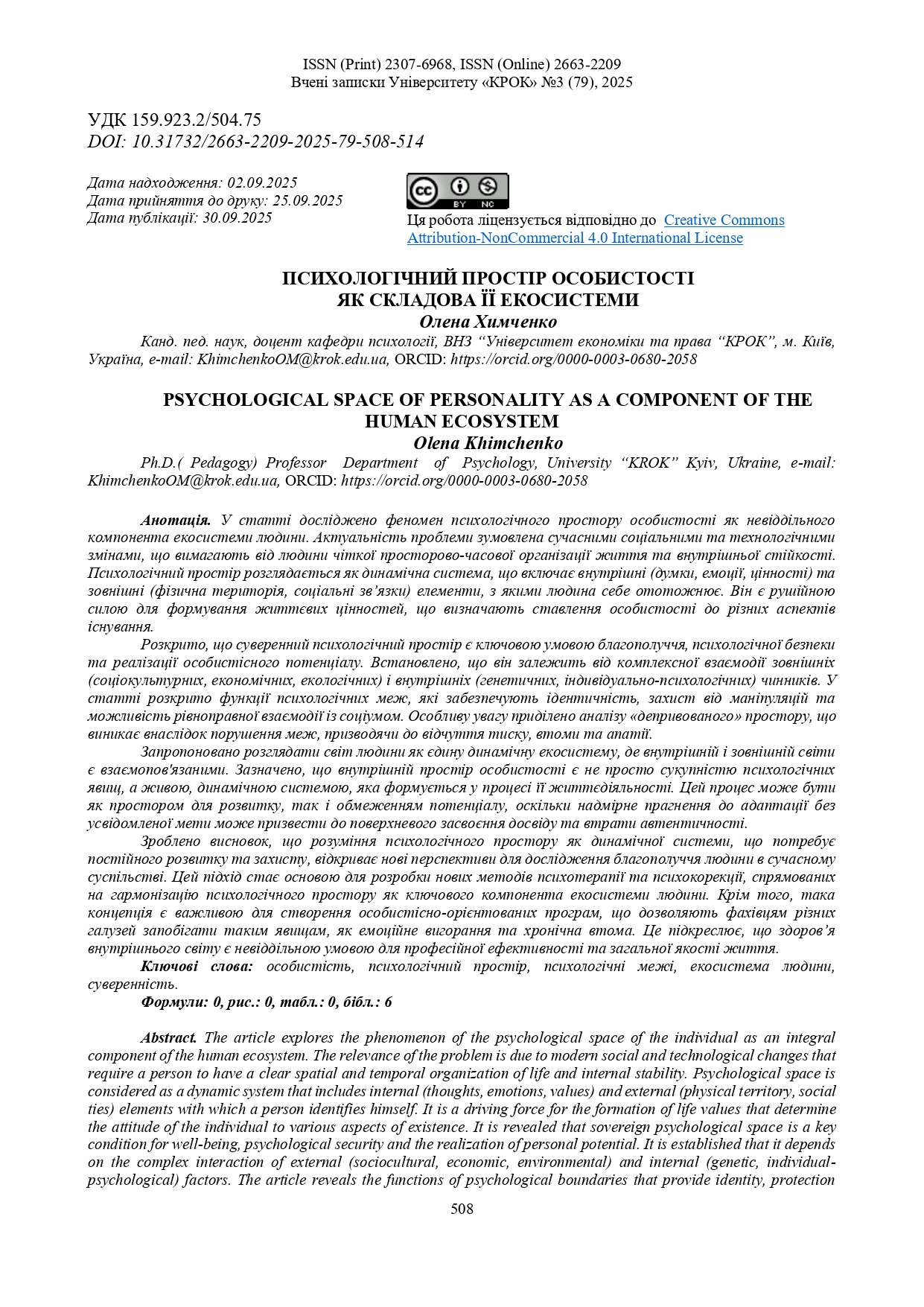ПСИХОЛОГІЧНИЙ ПРОСТІР ОСОБИСТОСТІ ЯК СКЛАДОВА ЇЇ ЕКОСИСТЕМИ
DOI:
https://doi.org/10.31732/2663-2209-2025-79-508-514Ключові слова:
Ключові слова: особистість,, психологічний простір,, психологічні межі,, екосистема людини,, суверенність.Анотація
У статті досліджено феномен психологічного простору особистості як невіддільного компонента екосистеми людини. Актуальність проблеми зумовлена сучасними соціальними та технологічними змінами, що вимагають від людини чіткої просторово-часової організації життя та внутрішньої стійкості. Психологічний простір розглядається як динамічна система, що включає внутрішні (думки, емоції, цінності) та зовнішні (фізична територія, соціальні зв’язки) елементи, з якими людина себе ототожнює. Він є рушійною силою для формування життєвих цінностей, що визначають ставлення особистості до різних аспектів існування.
Розкрито, що суверенний психологічний простір є ключовою умовою благополуччя, психологічної безпеки та реалізації особистісного потенціалу. Встановлено, що він залежить від комплексної взаємодії зовнішніх (соціокультурних, економічних, екологічних) і внутрішніх (генетичних, індивідуально-психологічних) чинників. У статті розкрито функції психологічних меж, які забезпечують ідентичність, захист від маніпуляцій та можливість рівноправної взаємодії із соціумом. Особливу увагу приділено аналізу «депривованого» простору, що виникає внаслідок порушення меж, призводячи до відчуття тиску, втоми та апатії.
Запропоновано розглядати світ людини як єдину динамічну екосистему, де внутрішній і зовнішній світи є взаємопов'язаними. Зазначено, що внутрішній простір особистості є не просто сукупністю психологічних явищ, а живою, динамічною системою, яка формується у процесі її життєдіяльності. Цей процес може бути як простором для розвитку, так і обмеженням потенціалу, оскільки надмірне прагнення до адаптації без усвідомленої мети може призвести до поверхневого засвоєння досвіду та втрати автентичності.
Зроблено висновок, що розуміння психологічного простору як динамічної системи, що потребує постійного розвитку та захисту, відкриває нові перспективи для дослідження благополуччя людини в сучасному суспільстві. Цей підхід стає основою для розробки нових методів психотерапії та психокорекції, спрямованих на гармонізацію психологічного простору як ключового компонента екосистеми людини. Крім того, така концепція є важливою для створення особистісно-орієнтованих програм, що дозволяють фахівцям різних галузей запобігати таким явищам, як емоційне вигорання та хронічна втома. Це підкреслює, що здоров’я внутрішнього світу є невіддільною умовою для професійної ефективності та загальної якості життя.
Завантаження
Посилання
Волинчук, О. (2020). Межі психологічного простору та комунікативна толерантність ранніх юнаків. Вісник Харківського національного університету імені В.Н. Каразіна. Серія «Психологія», 68, 52–56.
Гаврилюк, І. (2019). Суверенність психологічного простору: особистісно-поведінкові предиктори прояву. Теорія і практика сучасної психології, 1, 39–44.
Гончаренко, Ю. (2016). Соціально-психологічні особливості якості життєвого простору особистості. Актуальні проблеми психології: збірник наукових праць Інституту психології імені Г. С. Костюка НАПН України, 41, 108–116.
Швалб, Ю., & Вернік, О. та ін. (2015). Соціально-психологічні засади становлення екологічно орієнтованого способу життя особистості : монографія. Київ : Педагогічна думка, 216 с.
Lucas, R. E., Clark, A. E., Georgellis, Y., & Diener, E. (2004). Unemployment Alters the Set Point for Life Satisfaction. Psychological Science, 1, 8–13.
Rycek, R. F. (1998). Adolescent egocentrism and cognitive functioning during late adolescence. Adolescence, 33, 746–750.

Downloads
Опубліковано
Як цитувати
Номер
Розділ
Ліцензія

Ця робота ліцензується відповідно до Creative Commons Attribution-NonCommercial 4.0 International License.

